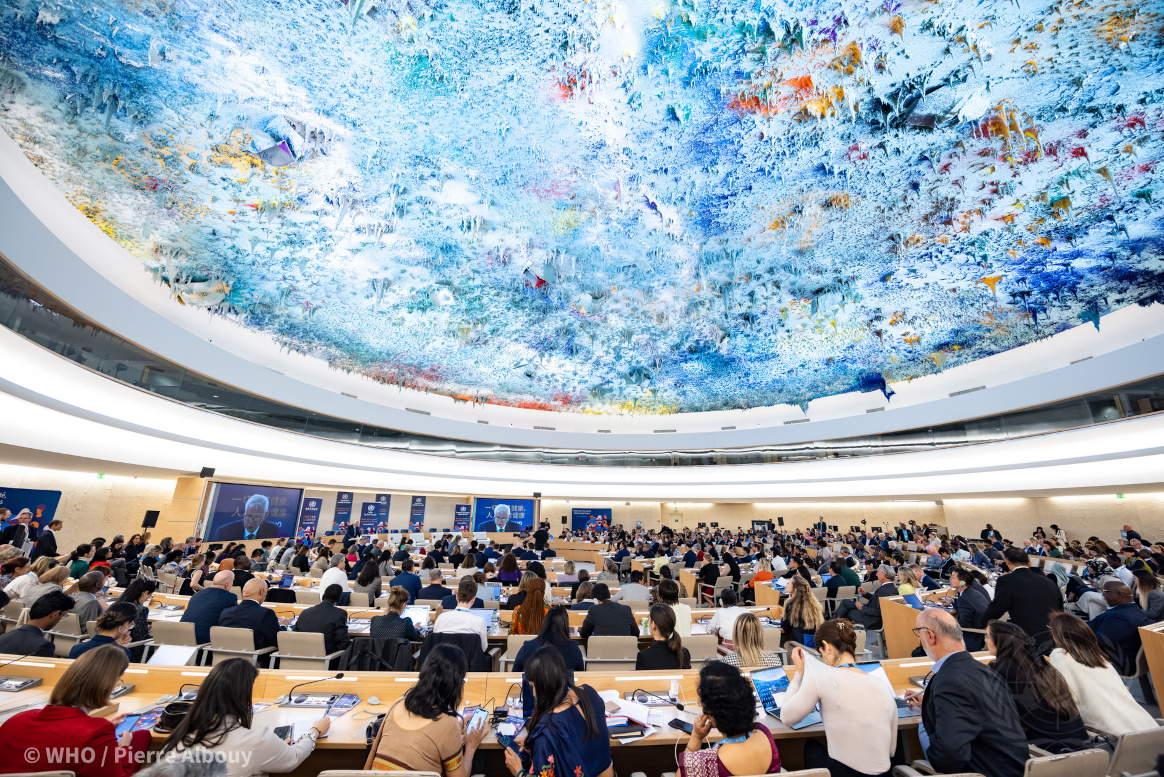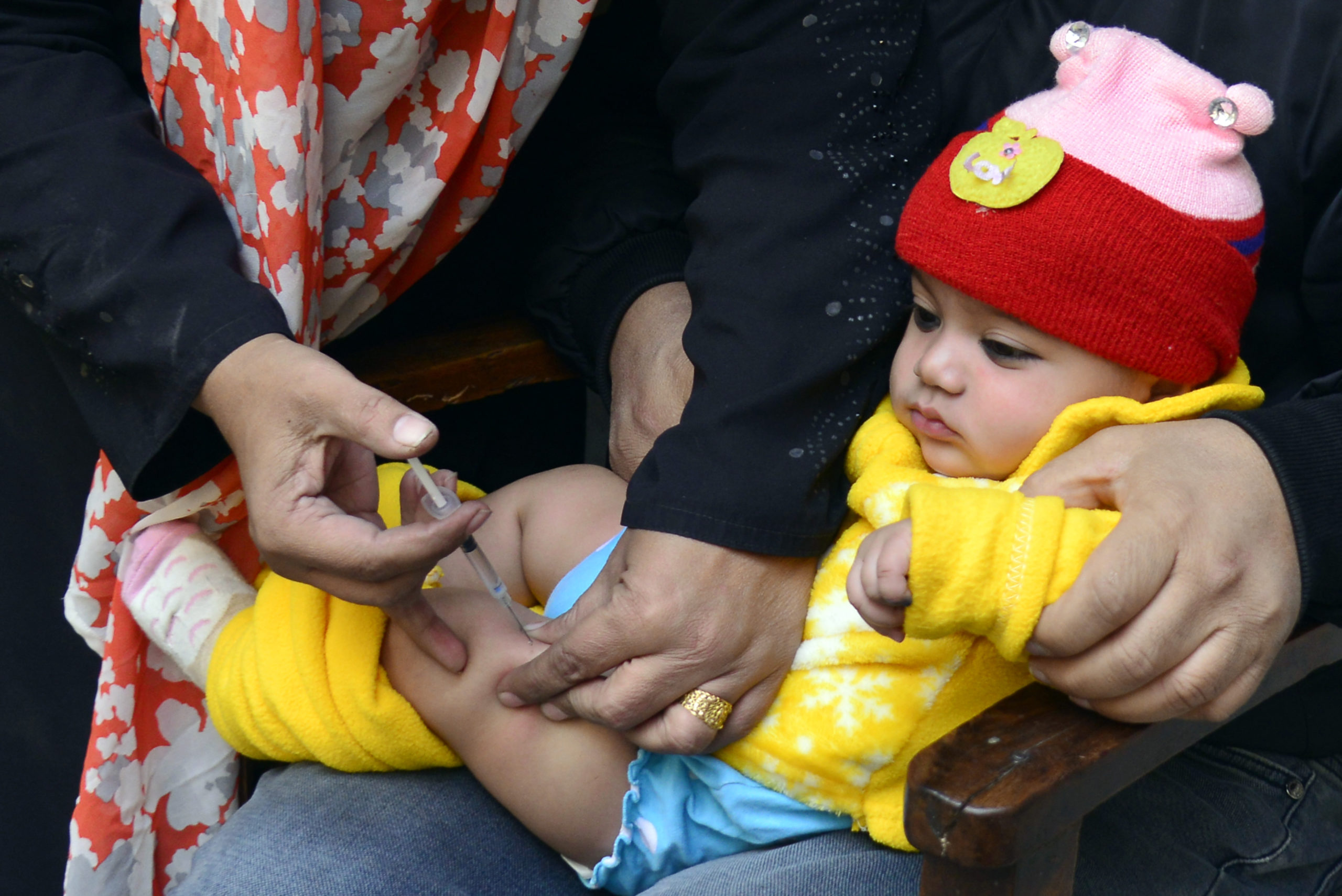
Ministers of Health, policy makers and public health experts from around the world met this week at the annual World Health Assembly (WHA) in Geneva, Switzerland, to set global public health policy. Aiming to agree ways forward on issues ranging from reaching all children with vaccines during the year that the world celebrates the 50th anniversary of the EPI programme to dealing with growing antimicrobial resistance and reaching people living in areas of conflict with basic health services, delegates also discussed developments related to the Global Polio Eradication Initiative (GPEI). But why is this important? The decision to eradicate polio was taken long ago by the WHA – so why does it continue to feature on the agenda of the body that governs the World Health Organization?
While the GPEI is composed of six partners, the eradication effort and its strategy are fully owned and implemented by national governments, the Member States of the WHA. WHO, Rotary International, the US Centers for Disease Control and Prevention (CDC), UNICEF, the Gates Foundation and Gavi, the Vaccine Alliance support the global eradication strategy, monitor and evaluate implementation and fine-tune approaches. Between them, they provide expertise on the ground, scientific research, policy direction, financing, community engagement and advocacy. However, it is governments who are the primary owners of the global eradication effort, and communities who are the primary beneficiaries. All Member States and their populations will benefit equally from a polio-free world. The WHA is the primary convening mechanism for Member States, and the global ownership and decision-making related to polio eradication is taken by the WHA. In short, it is the ultimate and final oversight mechanism of the GPEI.
It started in 1988, when Member States adopted the goal of worldwide polio eradication. But that only marked the beginning of its oversight. Over the years, the WHA has adopted a number of strategic approaches to intensify the eradication effort, endorse new global vaccine solutions including the phased removal of oral polio vaccines (OPV), and to transition the polio assets, tools and knowledge to contribute to broader public health, agree on containment measures needed to safeguard a lasting polio-free world, address the need to minimize the international spread of polioviruses – which culminated in polio eradication being designated a Public Health Emergency of International Concern under the International Health Regulations.
Recognizing the unique nature of an eradication effort, the WHA has requested a comprehensive update on efforts to reach global eradication and to sustain a polio-free world at each annual WHA session (and via its Executive Board, typically held at the beginning of each year). This ensures that polio remains at the top of the global public health agenda, even as new global or regional public health threats emerge. In a demonstration of Member States holding one another accountable, the WHA expects the most up-to-date epidemiological and programmatic reports, a very clear picture of what challenges must be overcome, and who will be responsible to overcome them. This is particularly critical with a highly infectious disease that does not respect international borders.
So it is anything but ‘business as usual’, when Member States at the WHA examine the global polio situation and prospects for success. This year again, despite all the other critical public health issues being discussed, Member States spent time collectively reviewing the situation, examining challenges, celebrating successes and cautioning against complacence. Member States focused their discussions on the remaining endemic wild poliovirus type 1 (WPV1) strains in only a handful of districts of just two countries; reviewed the global emergency related to variant poliovirus type 2 outbreaks, limited to parts of a few countries with the most intense transmission; celebrated the African continent again becoming free of WPV1 following detection in 2022 of an imported poliovirus; called for bolstered integration efforts, and recognized recent announcements of new commitments by long-standing and new partners. Member States also discussed the new strategic framework for polio transition, which builds on lessons learned, and recognized the need for strong ownership and accountability during the polio post-certification era, to sustain a polio-free world.
Rotary International, representing its 1.2 million members worldwide as well as broader civil society, addressed Member States and reiterated its support to all countries in the effort. Most importantly, Member States unanimously reaffirmed their collected resolve to achieve a lasting polio-free world and committed to fully implementing strategic approaches in all areas, by mobilizing strong support and necessary resources.
“Progress in reducing both wild and variant polio virus in 2023, renewed access in areas critical to polio eradication, and recent investments renew hope and confidence that we will achieve our goal.
We applaud increased collaboration among the GPEI, Gavi and EPI to protect all children from vaccine preventable diseases. Such collaboration is essential to overcome challenges and fulfill the promise of a polio free world while also providing broader essential immunizations and services,” said Professor Pierre Hoffmeyer, Rotary International Representative to the United Nations in Geneva, addressing the WHA.
As GPEI partners, we take this opportunity to express our sincere and deepest gratitude, on behalf of the children of the world, for the WHA’s unwavering commitment to polio eradication. We in turn commit to doing everything we can to support you, the Member States. Together, let us realise the dream first dreamed up by Rotary International, and ensure that no child anywhere will ever again be paralysed by poliovirus.



